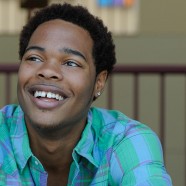
Whether dancing in a piece he’s choreographed or running a play down the football field, Joseph Reynolds likes to move. His energy fi lls a room. Activity, excitement and vibrancy are magnets that draw him. A love for action is a great quality for a Milton student, but it can be a drawback when hunkering down and getting serious are necessary. Joseph’s first set of Class IV grades threw up a brick wall, and this young man who was moving quickly had to take a step back and reassess.
“It was the idea that there were people smarter than me,” said Joseph. “In the New York City public school system, I was chosen from thousands of sixth-graders to attend an advanced middle school and then chosen for a prestigious prep placement program. I knew how to work hard and get myself to learn, but these students at Milton knew how to absorb the information faster than I could. That was a big challenge. Grades like this were a new thing for me.”
Joseph brought a strong set of academic skills to Milton. The Prep for Prep program is “rigorous and intense.” He commuted by subway an hour and a half from his home in Brooklyn to Manhattan for classes on weekends and during the summer months. In fact, Joseph was taking classes at Prep until two weeks before he arrived at Milton and moved into Norris House.
“Coming straight from that program, I thought ‘Time to take a break!’” says Joseph with a laugh. “I lost my gusto for academics. I was so excited to be away from home. I signed up for activities period every day of the week. I was always getting involved. I took on big challenges and overextended myself.”
Early on, and despite his first grades, Joseph thought he had the situation under control and didn’t interact much with his teachers. This changed as he learned to cultivate those relationships.
“Something about my motivation shifted. When I got closer to my teachers, I knew when they were disappointed in me, and I didn’t want to disappoint them. When I talked to them, I could see that they cared deeply about how I did, and that made me want to work harder.”
 At the end of his Class III year, Joseph’s grades were improving. He knew, however, that he wasn’t meeting his own potential. A conversation with a former Milton student, who was also Joseph’s advisor from the Prep program, changed the dynamic. His advisor challenged Joseph to reevaluate what “working hard” meant and to remove the word “can’t” from his vocabulary. Joseph really started to think about how he was spending his time. “What activities am I really invested in? What am I getting and learning from each thing I’m doing?”
At the end of his Class III year, Joseph’s grades were improving. He knew, however, that he wasn’t meeting his own potential. A conversation with a former Milton student, who was also Joseph’s advisor from the Prep program, changed the dynamic. His advisor challenged Joseph to reevaluate what “working hard” meant and to remove the word “can’t” from his vocabulary. Joseph really started to think about how he was spending his time. “What activities am I really invested in? What am I getting and learning from each thing I’m doing?”
He still worked at finding the balance of work and play. In his Class II year, Joseph became an advisor for new students in Norris House.
“If I have the responsibility to take care of these new students, I need to take care of myself first. I need to be able to do my homework in order to help them get their homework done. I took on this advising task; I need to keep up my end of the bargain, and I want to do it well.”
Joseph learned a wiser approach to his various commitments and schoolwork. He started breaking his responsibilities down into smaller tasks, setting goals that were realistic. This made tackling the larger projects easier. He refound his groove. Still busy with dance productions, football practice and a heavy course load, he had mastered managing his Milton life. Now Joseph is on the move again. He’s in California attending Pomona College. Maybe he’s sharing what he’s learned for himself with his new peers who have a similar experience just ahead.
Liz Matson



